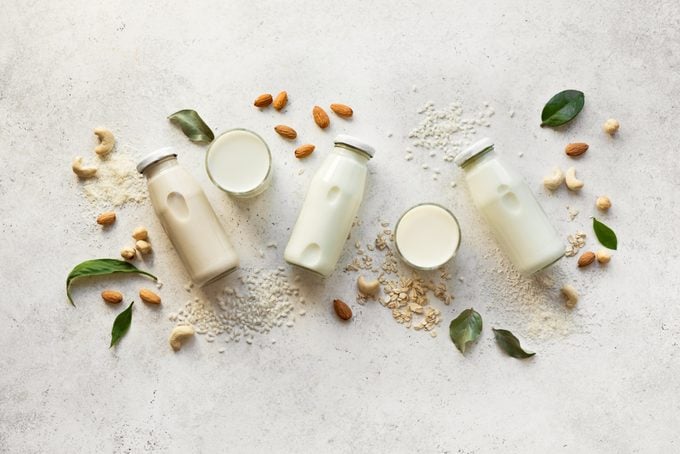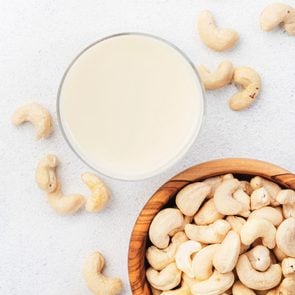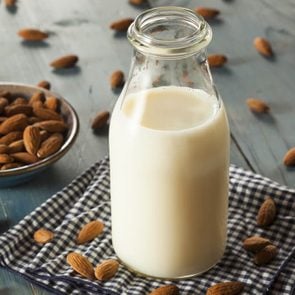Cashew Milk vs. Almond Milk: What’s the Difference?
Updated: Mar. 18, 2021
These nut milks are both nutritionally different than cow's milk. Here's what you need to know about cashew milk vs. almond milk.
Our editors and experts handpick every product we feature. We may earn a commission from your purchases.
Cashew milk vs. almond milk
Consuming plant-based “milks” including almond milk and cashew milk has become one of the hottest food trends of the last decade. And it shows no signs of slowing down: A February 2020 report by Koncept Analytics expects more than a 10 percent annual growth rate from 2020 to 2024 in the plant-based milk market.
“There are many reasons why someone would want to try nut milks, including choosing a lactose or dairy-free option due to allergies or intolerances, or wanting to choose an animal-free option for reasons of health, sustainability, or animal ethics,” says Desiree Nielsen, RD, a registered dietitian in Vancouver and author of Eat More Plants. (Here’s the difference between non-dairy vs. dairy-free.)
According to the U.S. National Library of Medicine, 65 percent of people have a hard time digesting lactose, a sugar found in dairy milk. For those looking for a more environmentally-conscious option, a study published in 2018 in Science found that meat and dairy farming has a disproportionate, negative influence on the environment compared to the amount of food it provides. (Here are more plant-based swaps to try.
The myriad of plant-based milk alternatives, though, can be overwhelming: Almond milk is a go-to favorite, but cashew milk is also on the rise.
So which of the two nut milks is best? And is there any difference? Nutritionally, almond milk and cashew milk are comparable. “Store-bought unsweetened almond milk and cashew milk will be very similar in terms of the basic nutrients,” Nielsen says.
But there are subtle differences in taste that might sway you toward one or the other.
“Each type of nut or plant milk is slightly different in flavor and mouth-feel, so try them all until you find the one you like best,” says Robin Foroutan, RDN, a New York-based integrative medicine dietitian and spokesperson for the Academy of Nutrition and Dietetics. “They’re pretty similar nutritionally, so choose whichever you like most.”
Here’s what you need to know about the difference between cashew milk vs. almond milk.
What exactly are nut milks?
Nut “milks” aren’t milk in the traditional sense because they don’t come from an animal. There has actually been an ongoing debate over the U.S. Food and Drug Administration’s (FDA) labeling requirements for dairy alternatives such as almond milk and cashew milk. Part of the argument against calling nut milks “milk” is that consumers may not realize these products are nutritionally very different from cow’s milk.
Whatever we call them, almond milk and cashew milk are made the same way. “The process for making cashew milk is very similar to almond milk,” says Atlanta-based registered dietitian nutritionist Rahaf Al Bochi, RDN, spokesperson for the Academy of Nutrition and Dietetics and owner of Olive Tree Nutrition.
“The milk is made by blending the nuts and water, then removing the solid pulp and adding ingredients like salt to enhance flavor,” she adds. Commercial nut milks may also have thickeners, stabilizers, and preservatives, as well. (Here’s how to make almond milk at home.)
What are the best versions?
With so many brands on the market, it can be hard to know which to pick. “When it comes to store-bought nut milks, the biggest red flag is the sugar content, which can be significant,” Nielsen says. “I recommend buying unsweetened varieties to avoid added sugar.”
Also, check out the label for what else is going into your milk, whether almond or cashew. “Some products may offer added protein; if so, is it naturally occurring from the nuts or is it added—for example, added pea protein?” Nielsen says. Consumers should know that store-bought nut milks do not have as much protein as cow’s milk. (Here’s how to eat more protein.)
But, store-bought nut milks are usually fortified to better match up to some of the other nutrients in cow’s milk. “While most products offer calcium and vitamin D, it’s always worth taking a quick peek at the nutrition label to ensure it,” Nielsen says. When fortified, “nut milks are a convenient way to get the calcium you need without consuming dairy.”
How does the price compare?
Both almond milk and cashew milk are a bit more expensive than cow’s milk. But in comparing them to each other, “price-wise, almond milk and cashew milk are usually similar,” Nielsen says. Especially when comparing among the same brand: We found the popular Silk brand of unsweetened almond milk and unsweetened cashew milk for the same price at Walmart ($2.78 for a half-gallon) and Target ($3.19). We’ve also seen both a bit more expensive; for example, on Instacart for $4.09.
But, you also might want to look beyond the big-name brands.
“Choose a brand that resonates with you: Are you looking for organic options? Do you prefer fewer emulsifiers? Is there a locally produced brand you can support?” Nielsen says. After nutritional considerations, “what’s most important is finding a brand with a flavor and texture you enjoy.”

Nutritional profiles
Here we have another tie between almond and cashew milk. The bigger differences can be found in how they compare to their whole-nut forms and how they measure up to dairy milk.
Research on nuts, including almonds and cashews, has consistently shown health benefits to your heart, diabetes risk and management, and weight management. (Here’s more on cashew nutrition.)
Almond milk
“Almonds are slightly higher in fiber and protein compared with cashews, but the difference is negligible,” Al Bochi says. “They are very similar in other nutrients like magnesium and phosphorus.” Both almonds and cashews rank among the healthiest nuts you can eat. (Here’s what you need to know about almond milk nutrition.)
But unless you’re making homemade nut milk, “most almond and cashew milks aren’t as nutrient-dense as their whole-food form,” Nielsen says.
“For example, almonds contain a decent amount of protein, but store-bought varieties of almond milk are typically protein-free,” she says. They “contain a small amount of healthy fat, perhaps small amounts of a few naturally occurring minerals such as iron or magnesium. The vast majority of their nutrition comes from required fortification of calcium, and vitamins A and D.”
Cashew milk
The same is true for cashew milk. “Cashews are quite rich in healthy fats—but store-bought varieties of cashew milks usually only contain about 2 grams of fat, as well as perhaps a little bit of naturally occurring copper,” Nielsen says. “Micronutrients—vitamins A, E, D, and calcium—are the same [for both], as they are fortified to legislated levels.”
Calorie-wise, “cashew milk is similar to almond milk, although slightly lower in calories with 25 calories per cup compared to 30 per cup in almond milk,” says Erin Palinski-Wade, RD, a New Jersey-based registered dietitian and author of 2 Day Diabetes Diet.
Nutrition facts
As always, whatever brand you’re buying, make sure you take a look at the label first. “It’s important to check labels to make sure the milk is fortified with calcium and vitamin D,” Al Bochi says. But, in general, “there are no notable differences between cashew and almond milk.”
Here are the nutrition facts for one cup (240 mL) of Silk’s unsweetened almond milk:
Calories: 30
Total Fat: 2.5 g (3% DV)
Sodium: 125 mg (5% DV)
Total Carbohydrate: 1 g (0% DV)
Dietary Fiber: <1 g (2% DV)
Total Sugars: 0 g
Protein: 1 g
Here are the nutrition facts for one cup (240 mL) of Silk’s unsweetened cashew milk:
Calories: 25
Total Fat: 2 g (3% DV)
Cholesterol: 0 mg (0% DV)
Sodium: 160 mg (7% DV)
Total Carbohydrate: 1 g (0% DV)
Dietary Fiber: 0 g 0%
Total Sugars: 0g
Protein: <1 g
How do they compare to dairy milk?
If you’re replacing dairy milk with a nut milk like almond or cashew, you won’t be getting the same thing nutritionally, as a review of studies published in 2018 in the Journal of Food Science and Technology shows.
“Dairy milk will typically offer more naturally occurring protein—about eight grams of protein per cup— and about 300 mg of calcium,” Nielsen says. “Fat content will vary depending on which kind of [dairy] milk you buy. In the United States, nut milks [which are fortified] typically have more calcium than dairy milk—about 450 mg. Dairy milk will also contain more potassium than nut milks.”
But for those looking to cut calories, almond and cashew milk are much lower: 25 or 30 calories per cup compared to 122 calories in a cup of two percent cow’s milk, according to the U.S. Department of Agriculture. Unsweetened nut milks are also much lower in sugar than cow’s milk (0 grams vs. almost 12 grams); however, the FDA does not have a daily allowance for naturally occurring sugar.
(Here’s what happens when you go on a dairy-free diet.)
Are there environmental or ethical concerns?
Although some are steering away from dairy because of the impact of cows’ carbon footprint, both almond milk and cashew milk are not without their environmental and humanitarian concerns. Over 80 percent of the world’s almonds are grown in California. The amount of water it takes to produce them (over three gallons for a single almond, according to a 2019 report in Ecological Indicators) is a major concern for scientists. Another problem is the effect on honey bees, which pollinate almond trees. They have been dying due to the pesticides used, according to a study published in 2018 in Insects.
The almond industry has been taking steps to address both issues, but they are still considerations for consumers.
As for cashews, which are exported mainly from India and Vietnam, conditions for workers there can be poor, especially given that cashew shells contain a natural toxin similar to poison ivy that can cause burns and scarring if workers aren’t protected properly.
Can you make your own?
Another option to avoid some of the nutritional pitfalls of store-bought almond or cashew milk is to make your own. In doing so, you’ll know exactly what—and how much—is in your milk, which will retain more of the nuts’ natural nutrients.
“The nutritional value of nut milks depend on whether we’re talking homemade or store-bought,” Nielsen says. “If making homemade nut milks, there will typically be more protein, fats, and minerals—although I highly recommend ‘fortifying’ your homemade nut milks with calcium as it won’t be as high as store-bought.” (Or you can add to your diet these foods with more calcium than a glass of milk.)
“I often buy nut milks because I consume a lot of them, and it’s so convenient,” Nielsen says. “However, it is also really easy to make them at home. And you’ll end up with a more nutrient-dense product. So if you can, it’s worth it to make homemade.”
How do you make your own?
For DIYers, “all you have to do is soak your almonds or cashews overnight—typically one cup for one quart of water—and then blend in a high speed blender with a pinch of salt and any flavoring you desire, such as vanilla,” Nielsen says. “If you are consuming homemade nut milk daily, I highly recommend you get a liquid calcium to add to your nut milk so you don’t miss out on extra calcium.” (Here’s a more detailed look at how to make almond milk and how to make cashew milk.)
You can either drink it straight up for the whole-food benefits, or strain it in a tightly woven nut milk bag, she says. But here’s where cashew milk beats almond milk: Cashews are softer, so you don’t have to strain the milk. You’ll consume the entire nut and all its nutrients, which are considerable.
Registered dietitian and oncology nutrition specialist Julie Lanford, RD, wellness director of Cancer Services, Inc, in Winston-Salem, North Carolina, estimates her homemade cashew milk to have almost nine grams of protein, compared to one gram in store-bought almond milk or less than one gram in store-bought cashew milk.
You’ll probably want to strain homemade almond milk; however, if you consume the pulp separately you’ll still be getting the whole nut nutrients. “The leftover pulp can be dried and used in porridge or baking so nothing goes to waste,” Nielsen says.
Either way, homemade versions of both cashew and almond milk will allow you to avoid any additives. “The milk will naturally separate because it doesn’t contain stabilizers, but you can just shake it up before you use it,” Nielsen says.
How do taste and texture compare?
The almond milk vs. cashew milk flavor battle is not really about the taste.
“The ‘taste difference’ between almond and cashew milk is more of a texture difference,” Lanford says. “Cashews are creamier.” Although this is, of course, a matter of personal preference, cashew milk might win out here, as well. “It is a slightly creamier milk, so the taste may appeal to those looking for a richer tasting milk,” Palinski-Wade says.
But if you are curious about the taste itself, “cashew milk has an earthier flavor,” Al Bochi says. “Choosing a milk comes down to flavor preference.”
The last word
The bottom line: Nutritionally, almond milk and cashew milk are similar, although homemade versions may favor cashew milk. And although almond milk is more popular, many people prefer the creaminess of cashew milk. We give the slight edge to cashew milk, but either way, you can’t go wrong when deciding between the two.
Next, here are the best plant-based protein sources.




